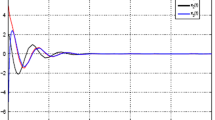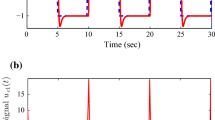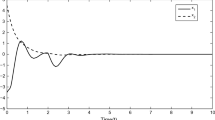Abstract
In this paper, a novel decoupled architecture-based anti-windup compensator (AWC) synthesis technique is presented for the constrained nonlinear time-delay systems. The proposed decoupling AWC architecture is applicable to both stable and unstable nonlinear time-delay systems and it simultaneously fulfills the requirements of attainment of stability and reasonable closed-loop performance. The proposed AWC architecture is modified with the aim to characterize the synthesis goals of the delayed nonlinear AWC by using the linear parameter varying model-based reformulation property of the Lipschitz nonlinearities. To compute the gain matrices for global or local stability through the proposed AWC, several sufficient conditions have been formulated using a Lyapunov–Krasovskii functional, the \(L_2 \) gain minimization, the generalized sector condition and the information of bounds of delay. The proposed approach is less conservative than the existing methods due to useful terms in handling the range of time-delay. Further, the resultant method is better than the conventional methods owing to the incorporation of reformulation property for efficient handling of the Lipchitz nonlinearities. The effectiveness of the proposed AWC schemes is demonstrated via simulation results.







Similar content being viewed by others
References
Slotine, J.-J.E., Li, W.: Applied Nonlinear Control. Prentice-Hall, Englewood Cliffs (1991)
Tarbouriech, S., Turner, M.: Anti-windup design: an overview of some recent advances and open problems. IET Control Theory Appl. 3, 1–19 (2009). doi:10.1049/iet-cta:20070435
Stein, G.: Respect the unstable. IEEE Control Syst. 23, 12–25 (2003). doi:10.1109/MCS.2003.1213600
Anonymous: Why the gripen crashed, Aerosp. Am. 32, 11 (1994)
Dornheim, M.A.: Report pinpoints factors leading to YF-22 crash. Aviat. Week Space Technol. 137(19), 53–54 (1992)
Tyan, F., Bernstein, D.S.: Anti-windup compensator synthesis for systems with saturation actuators. Int. J. Robust Nonlinear Control 5, 521–537 (1995). doi:10.1002/rnc.4590050510
Saberi, A., Lin, Z., Teel, A.R.: Control of linear systems with saturating actuators. IEEE Trans. Autom. Control 41, 368–378 (1996). doi:10.1109/9.486638
Chen, Y., Fei, S., Zhang, K.: Stabilization of impulsive switched linear systems with saturated control input. Nonlinear Dyn. 69, 793–804 (2012). doi:10.1007/s11071-011-0305-y
Park, B.Y., Yun, S.W., Park, P.G.: H-2 state-feedback control for LPV systems with input saturation and matched disturbance. Nonlinear Dyn. 67, 1083–1096 (2012). doi:10.1007/s11071-011-0052-0
Ran, M., Wang, Q., Dong, C., Ni, M.: Multistage anti-windup design for linear systems with saturation nonlinearity: enlargement of the domain of attraction. Nonlinear Dyn. 80, 1543–1555 (2015). doi:10.1007/s11071-015-1961-0
Rehan, M., Hong, K.-S.: Decoupled-architecture-based nonlinear anti-windup design for a class of nonlinear systems. Nonlinear Dyn. 73, 1955–1967 (2013). doi:10.1007/s11071-013-0916-6
Edwards, C., Postlethwaite, I.: An anti-windup scheme with closed-loop stability considerations. Automatica 35, 761–765 (1999). doi:10.1016/S0005-1098(98)00225-8
Ahmed, A., Rehan, M., Iqbal, N.: Delay-dependent anti-windup synthesis for stability of constrained state delay systems using pole-constraints. ISA Trans. 50(2), 249–255 (2011). doi:10.1016/j.isatra.2010.11.003
Gu, K., Khrtonov, V.L., Chen, J.: Stability of Time-Delay Systems. Birkhäuser, Boston (2003)
Ahn, C.K., Shi, P., Wu, L.: Receding horizon stabilization and disturbance attenuation for neural networks with time-varying delay. IEEE Trans. Cybern. 45, 2680–2692 (2015). doi:10.1109/TCYB.2014.2381604
Niculescu, S.L.: Delay Effects on Stability: A Robust Control Approach. Springer, London (2001)
Richard, J.-P.: Time-delay systems: an overview of some recent advances and open problems. Automatica 39(10), 1667–1694 (2003). doi:10.1016/S0005-1098(03)00167-5
Choi, H.H., Chung, M.J.: An LMI approach to \(H_\infty \) controller design for linear time-delay systems. Automatica 33(4), 737–739 (1997). doi:10.1016/S0005-1098(96)00242-7
He, Y., Wang, Q.-G., Lin, C., Wu, M.: Delay-range-dependent stability for systems with time-varying delay. Automatica 43(2), 371–376 (2007). doi:10.1016/j.automatica.2006.08.015
Lehman, B., Shujaee, K.: Delay independent stability conditions and decay estimates for time-varying functional differential equations. IEEE Trans. Autom. Control 39(8), 1673–1676 (1994). doi:10.1109/9.310048
Yan, H., Zhang, H., Meng, M.Q.-H.: Delay-range-dependent robust \(H_\infty \) control for uncertain systems with interval time-varying delays. Neurocomputing 73(7), 1235–1243 (2010). doi:10.1016/j.neucom.2010.01.004
Tarbouriech, S., da Silva, J.G., Garcia, G.: Delay-dependent anti-windup loops for enlarging the stability region of time delay systems with saturating inputs. ASME J. Dyn. Syst. Meas. Control 125(2), 265–267 (2003). doi:10.1115/1.1569953. doi:10.3166/ejc.12.622-634
da Silva Jr, J.M.G., Tarbouriech, S., Garcia, G.: Anti-windup design for time-delay systems subject to input saturation an LMI-based approach. Eur. J. Control 12(6), 622–634 (2006). doi:10.3166/ejc.12.622-634
Tarbouriech, S., Da Silva, Gomes, Jr, J.M., Garcia, G.: Delay-dependent anti-windup strategy for linear systems with saturating inputs and delayed outputs. Int. J. Robust Nonlinear Control 14(7), 665–682 (2004). doi:10.1002/rnc.899
Park, J.-K., Choi, C.-H., Choo, H.: Dynamic anti-windup method for a class of time-delay control systems with input saturation. Int. J. Robust Nonlinear Control 10(6), 457–488 (2000). doi:10.1002/(SICI)1099-1239(200005)10:6<457::AID-RNC488>3.0.CO;2-P
Zaccarian, L., Nešić, D., Teel, A.R.: L\(_{2}\) anti-windup for linear dead-time systems. Syst. Control Lett. 54(12), 1205–1217 (2005). doi:10.1016/j.sysconle.2005.04.009
Hussain, M., Rehan, M.: Nonlinear time-delay anti-windup compensator synthesis for nonlinear time-delay systems: a delay-range-dependent approach. Neurocomputing 186, 54–65 (2016). doi:10.1016/j.neucom.2015.12.078
Zhou, Q., Li, H., Wu, C., Wang, L., Ahn, C.K.: Adaptive fuzzy control of nonlinear systems with un-modeled dynamics and input saturation using small-gain approach. IEEE Trans. Syst. Man Cybern. Syst. 99, 1–11 (2016). doi:10.1109/TSMC.2016.2586108
Lee, S.M., Kwon, O.M., Park, J.H.: Regional asymptotic stability analysis for discrete-time delayed systems with saturation nonlinearity. Nonlinear Dyn. 67, 885–892 (2012). doi:10.1007/s11071-011-0032-4
Gu, K.: An integral inequality in the stability problem of time-delay systems. In: Proceedings of the 39th IEEE CDC, vol. 3, pp. 2805–2810, Sydney (December 2000). doi:10.1109/CDC.2000.914233
Zemouche, A., Boutayeb, M.: On LMI conditions to design observers for Lipschitz nonlinear systems. Automatica 49, 585–591 (2013). doi:10.1016/j.automatica.2012.11.029
Ting, C.-S., Chang, Y.-N.: Robust anti-windup controller design of time-delay fuzzy systems with actuator saturations. Inf. Sci. 181(15), 3225–3245 (2011). doi:10.1016/j.ins.2011.03.015
Ahmad, S., Rehan, M., Hong, K.-S.: Observer-based robust control of one-sided Lipschitz nonlinear. ISA Trans. 65, 230–240 (2016). doi:10.1016/j.isatra.2016.08.010
Malik, M., Mohan, S.R.: Cone complementarity problems with finite solution sets. Oper. Res. Lett. 34, 121–126 (2006). doi:10.1016/j.orl.2005.03.007
Ahn, C.K., Shi, P., Basin, M.V.: Two-dimensional dissipative control and filtering for Roesser model. IEEE Trans. Autom. Control 60, 1745–1759 (2015). doi:10.1109/TAC.2015.2398887
Acknowledgements
This work was supported by Higher Education Commission (HEC) of Pakistan by supporting Ph.D. studies of the second and third authors through indigenous Ph.D. scholarship program (phase II, batch II, 2013).
Author information
Authors and Affiliations
Corresponding author
Rights and permissions
About this article
Cite this article
Akram, A., Hussain, M., us Saqib, N. et al. Dynamic anti-windup compensation of nonlinear time-delay systems using LPV approach. Nonlinear Dyn 90, 513–533 (2017). https://doi.org/10.1007/s11071-017-3678-8
Received:
Accepted:
Published:
Issue Date:
DOI: https://doi.org/10.1007/s11071-017-3678-8




